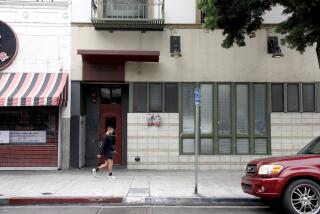U.S. Aid Sought in Crackdown on Slumlords : Fraud case: L.A. city attorney vows to seek help after a judge dealt a setback to his attempt to hold lenders responsible for conditions at the buildings.
A day after his office was dealt a severe setback in a dramatic bid to hold lenders responsible for slum conditions fueled by fraudulent loans, the Los Angeles city attorney vowed to ask federal regulators to participate in the crackdown.
City Atty. James Hahn, who started the effort by announcing a massive lawsuit against more than 140 defendants outside a shabby Hollywood apartment building in March, 1988, also said he would seek out a congressman to introduce laws that would prohibit the sort of fraudulent lending practices he alleges were committed by Los Angeles slum owners and their lenders.
Those lenders, the suit alleged, conspired with property owners to siphon fortunes out of crowded old buildings in the form of mortgage payments, leaving no money for repairs. Superior Court Judge Barnet M. Cooperman struck down Wednesdaythe most innovative portion of the lawsuit--the effort by city officials to sue federally regulated savings and loans.
Hahn said his office had not yet decided Thursday whether to appeal. Deputy City Atty. Stephanie Sautner said that if the ruling stands, federally regulated lenders would have free rein to violate local laws.
“This is a failure of regulatory agencies across the board,” Hahn said Thursday. “The laws are only as good as the ability to monitor and enforce them. You hope that when the federal agencies go in and look at their books, they are doing it carefully, noticing whether or not patterns begin to appear. I think, though, our experience with savings and loans indicates that did not go on.”
Among the violations alleged in the lawsuit: fraudulent use of notary public stamps, conflict of interest of bank officers, numerous bankruptcy frauds, the illegal use of straw owners to conceal true owners, unsound banking practices like those that led to the collapse of hundreds of savings and loans nationwide over the last few years.
Hahn said that despite the allegations of regulatory violations listed in his lawsuit, no other law enforcement agency or regulatory body ever called him--even after widespread publicity about the case.
“We never heard anything from anybody,” he said.
He stressed, however, that successes did come out of the suit. The 11 slum buildings listed in the lawsuit have nearly all been brought up to code, according to Deputy City Atty. Stephanie Sautner, head of Hahn’s housing enforcement section, and questionable lending practices used by certain defendants in the case have stopped, she said.
However, the case itself was dramatically cut back on Wednesday when Superior Court Judge Barnet M. Cooperman ruled that the city had no jurisdiction to sue its major defendant, Highland Federal Savings & Loan, because the institution was regulated by the federal government. Cooperman also dismissed allegations of racketeering against property owners and loan brokers. The case proceeds against more than 90 defendants, however.
A review shows that several government entities that made public statements announcing they planned to investigate the problems either decided against doing so or failed to follow up. There have also been these settlements and other developments since the case was filed:
--One of the worst slums was owned by Teluce Black, a dog reportedly belonging to Joe Fitzpatrick, a convicted slumlord and former business partner of the son of Ben Karmelich, the president of Highland Federal. A loan was taken out in the name of the dog from Highland Federal.
A second dog, Grover Black, was listed as president of a California slum corporation that petitioned for bankruptcy in 1985, and also was listed as accountant. Neighbors said Grover was a dog that belonged to a Fitzpatrick friend and another convicted slumlord named Bill Leyton.
“In the manual we’re called the watchdog of the federal bankruptcy court,” said Davis von Wittenberg, U.S. trustee in Los Angeles, at the time. Now, we’ve got a dog to watch”
Von Wittenberg is now retired. Assistant U.S. Atty. Maureen Tighe said Thursday that “the investigation has been closed and no indictment was ever brought.” The dog’s attorney, Milton Simon of Santa Monica, who signed federal document for the animal, said that as far he knows the investigation is over.
Jim Randall, chief of the notary division of the secretary of state’s office, said his office attempted to investigate an allegation that Karmelich, a notary public, notarized a document involving a transaction in which he had a financial interest. While Randall acknowledged that such a notarization “appears to be a clear violation” of state law, he said his investigator could not proceed because he could not find the right documents.
County Supervisor Mike Antonovich announced at the time that the Board of Supervisors had asked the district attorney to look into allegations involving slumlords. However, district attorney spokeswoman Sandi Gibbens said Thursday, “We never were sent a letter and never were asked to do anything. We weren’t asked to investigate anything.”
Joining the city attorney’s office in pressing the landmark lawsuit on behalf of tenants were the Legal Aid Foundation of Los Angeles and the private law firm of Litt & Stormer.
Michael Berk, attorney for Highland, said the judge’s ruling turned the remainder of the case into “a garden-variety civil lawsuit against the owners of the property, which is what it should have been in the first place.”
More to Read
Sign up for Essential California
The most important California stories and recommendations in your inbox every morning.
You may occasionally receive promotional content from the Los Angeles Times.










